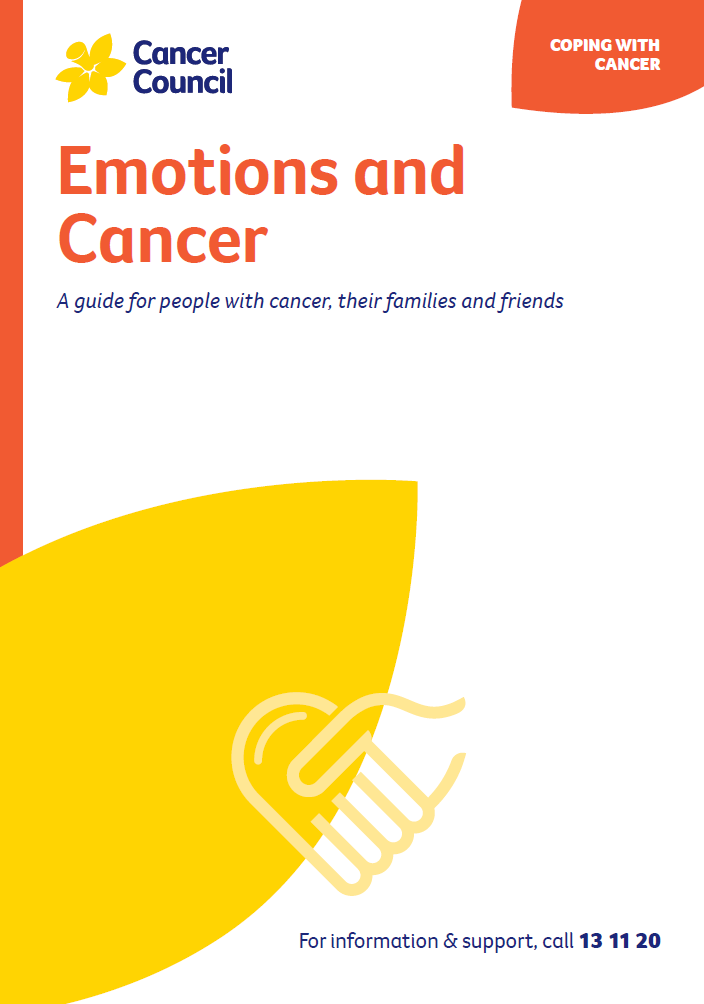- Home
- About Cancer
- Coping with a diagnosis
- Emotions and cancer
- Your coping toolbox
- Managing your thoughts
Managing your thoughts
People affected by cancer may find themselves going over and over the same distressing thoughts about the past, present or future. Ignoring such thoughts or trying to distract yourself may work at first, but they often return once you are no longer distracted – for example, during the middle of the night or early in the morning.
The strategies listed below may be a helpful starting point if you are finding it hard to manage your thoughts. To learn more, you can explore resources such as apps and podcasts or seek support from a professional.
Ways to manage your thoughts
| Identify where the thoughts come from | Ask yourself if your thoughts are the result of an underlying belief, such as “The world should be a fair and just place”, “If I can’t do everything I used to do, I am useless” or “I am a burden to my family and friends”. Or perhaps you tend to give personal meaning to everything that is happening, even to events that are beyond your control. For example, if you arrive at the treatment centre and can’t find a parking spot, you might think, “Nothing ever goes right for me. I don’t know why I’m bothering with the treatment, I know it won’t work.” |
| Consider your own advice | Think of someone you love and imagine what you would say to them if they felt the same way. |
| Check your thoughts | Ask yourself if you are jumping to conclusions or exaggerating the negatives. If so, is there something you can do to change the situation or improve it? |
| Write down your thoughts | This helps slow down your thinking and makes it easier to focus. It may also help you work out if a thought is based on facts, realistic or helpful. |
| Recognise the little positives | Some days it might be hard to find something positive. This is understandable, but if you feel like that every day, check whether you are ignoring any little achievements or happy events. Some people make a habit of writing down three good things that have happened to them each day. These don’t have to be major life events – they could just be an encouraging smile from a radiographer or a nice chat with a receptionist on a tough day. |
| Practise letting your thoughts come and go | It is important to remember that thoughts are fleeting. We tend to notice some, but there are many we don’t notice. Try to let your thoughts come and go without getting caught up in them. You could imagine they are clouds in the sky or leaves floating down a stream. Our Finding Calm During Cancer podcast may help you practise this. |
| Be kind to yourself | Use encouraging thoughts to talk yourself through difficulties, rather than criticising yourself (e.g. you could congratulate yourself for getting through a treatment session). This does not come naturally to most people, but counsellors and psychologists can teach you techniques to help you be kinder to yourself. |
| Seek professional help | Social workers, psychologists and other health professionals are trained to help people manage how they’re feeling. Check what support is available at your treatment centre or ask your GP for a referral. |
It can be helpful to track how you’re feeling, and some people use free online self-help programs or smartphone apps to do this. You could visit moodgym, Mindspot, or see the list of health and wellbeing apps on the Australian Government’s Healthdirect website.
Podcast: Coping with a Cancer Diagnosis
Listen to more of our podcast for people affected by cancer
More resources
Dr Michael Murphy, Psychiatrist, NSW Health, and Conjoint Senior Lecturer, UNSW, NSW (clinical review); A/Prof Anne Burke, Co-Director, Psychology and Allied Health Lead, Cancer, Central Adelaide Local Health Network and The University of Adelaide, SA; Hannah Chen, Psychologist, Cancer Council Queensland; Hazel Everett, Clinical Nurse Consultant, Cancer Services, St John of God Subiaco Hospital, WA; Shona Gates, Senior Social Worker, North West Cancer Centre, TAS; Dr Jemma Gilchrist, Senior Clinical Psychologist, Mind My Health and Crown Princess Mary Cancer Centre, Westmead, NSW; Sandra Hodge, Consumer; Dr Michael Murphy (see above); Caitriona Nienaber, 13 11 20 Consultant, Cancer Council WA; Dr Alesha Thai, Medical Oncologist, Peter MacCallum Cancer Centre, VIC; Alan White, Consumer.
View the Cancer Council NSW editorial policy.
View all publications or call 13 11 20 for free printed copies.

